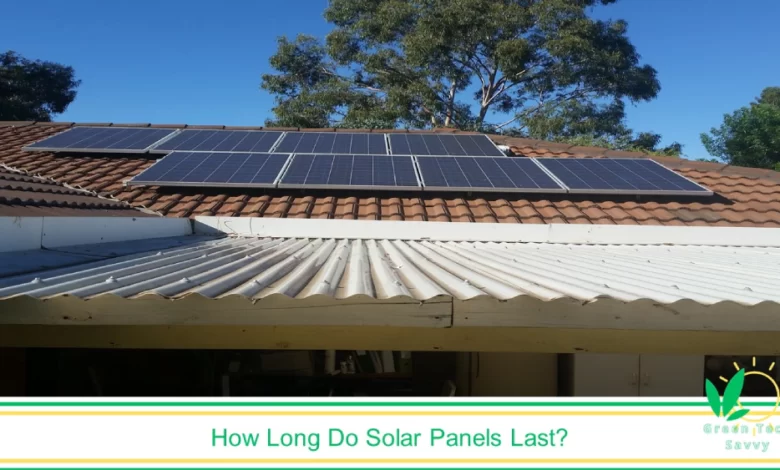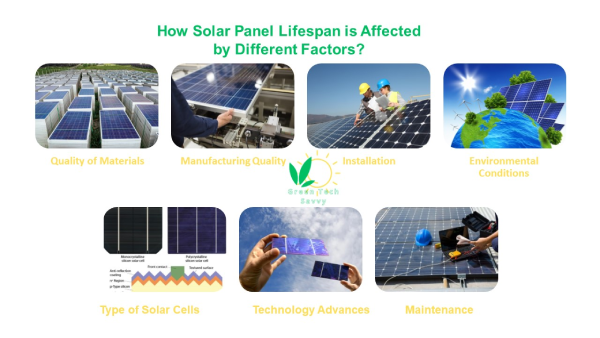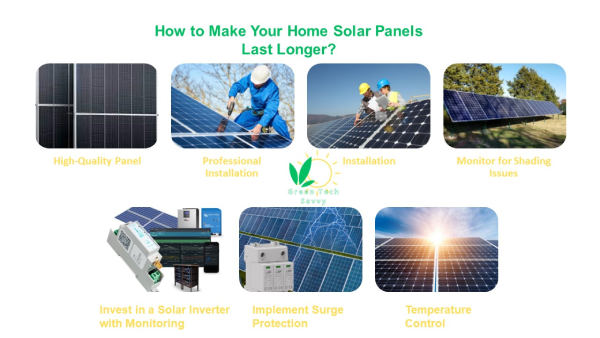Lifespan

How Long Do Solar Panels Last? (Life Span)
Solar panels last for 25 to 30 years before experiencing noticeable degradation. Even beyond life expectancy of a solar panel, panels still harness sunlight to generate electricity, albeit at a less efficient rate compared to their initial performance. While it is rare for a solar panel to cease energy production entirely, the degradation over time become significant enough to warrant the complete replacement of the panels.
Solar panel lifespan is the duration of a solar panel that is expected to function efficiently and produce electricity. The lifespan of panels is measured based on the manufacturer’s warranty. After 25 years of use, a solar panel still be capable of producing 80% of the electricity generated when it was new.
The average solar panel lifespan is affected by 7 main factors (quality of materials, manufacturing quality, proper installation, environmental conditions, maintenance,type of solar cells, technology advances).
The average solar panel lifespan is affected by 6 main factors (quality of materials, manufacturing quality, proper installation, environmental conditions, maintenance,type of solar cells, technology advances).
You are able to expand solar panel’s average longevity in 7 steps include (choosing high-quality panels, investing in a solar inverter with monitoring, following manufacturer guidelines, controlling the temperature). After panel’s the 25 years are end you have 4 choices including (to recycle the panels, to continue generate electricity).
Solar panel degradation is the decline in efficiency over a solar panel’s lifespan due to exposure to environmental factors. An annual degradation rate is around 0.5% to 0.7% for. Thus, solar panels still operate at 75% to 87.5% of their original efficiency after 25 years age, according to the Solar Energy Industries Association (SEIA).
The most efficient solar panels in 2024 are Monocrystalline panels, they last more and have lower degradation rates. Regardless of the degradation rate, solar panels never reach a point of complete expiration.
This article answers the following questions: What is a solar panel’s Lifespan? What is the Average Lifespan of Solar Panels? How Solar Panel Lifespan is Affected by Different Factors? How to Make Solar Panels Last More? What Happens to Solar Panels After 25 Years? What Is Solar Panel Degradation Rate? What Are the Most Efficient Solar Panels? Do Solar Panels Expire?
What is Solar Panels’s Lifespan?
Solar panel lifespan is the period during which the panel is last and operate efficiently and generate electricity. The life time of a solar panel is the number of years a solar panel works at a certain level of performance before its efficiency decreases to a specified threshold. The lifespan is a crucial factor for evaluating the long-term economic and environmental benefits of solar energy systems.
The standard measure for solar panel lifespan is based on the manufacturer’s warranty. For example, a common warranty might guarantee that a solar panel maintain at 75% to 87.5% of its initial efficiency after 25 years. This means that, according to the warranty, the panel should still be capable of producing 80% of the electricity generated when it was new after 25 years of use.
The average lifespan warranty of solar panels is generally not significantly different based on whether they are installed on a roof or the ground.
The mean lifetime guarantee of solar panels is 25 to 30 years. The average solar panel lifespan is affected by different factors (quality of materials, environmental conditions, technological advances, and proper installation).
Extending solar panels lifespan requires a combination of proper planning, installation, and maintenance.
What is the Average Lifespan of Solar Panels?
The mean lifetime guarantee of solar panels is 25 to 30 years. Many solar panel manufacturers provide warranties for at least 25 years, guaranteeing that the panels retain a certain level of efficiency during that time. These warranties ensure that the panels still produce 75% to 87.5% of their initial power output after 25 years. Solar panels do not need to be replaced within the first few decades of their use.
How Solar Panel Lifespan is Affected by Different Factors?
Solar panels lifespan is influenced by 7 different factors. The 7 factors that affect solar panels’ life expectancy are in the following picture.

7 key factors affect solar panel lifespan are in the next list.
- Materials Quality. Solar panels longevity depends on the overall quality of the materials used in manufacturing the solar panels. High-quality panels withstand environmental stressors over the long term.
- Manufacturing Quality. The durability of the panels depends on the precision and care taken during the manufacturing process.
- Installation. Correct installation is important for the long life of solar panel. When panels are installed incorrectly, they are more prone to damage or do not function optimally.
- Environment Conditions. The lifespan of solar panels is affected by local climate and environmental conditions affect solar panel performance.
- Maintenance. The lifetime of solar panels is longer when they get regular maintenance and cleaning to remove dirt and debris.
- Type of Solar Cells. Solar panels lifespan and durability are differ by types of solar cells. For instance, monocrystalline and polycrystalline solar panels are known for their long lifetime and durability compared to thin-film solar panels.
- Technology Advances. The overall longevity of solar panels has been enhanced with the new manufacturing technology. As solar technology advances, newer panels offer improved durability and performance compared to older models.
How to Make Solar Panels Last More?
To extend your solar panels lifespan, you need high-quality panels, professional installation, regular Maintenance, monitor for shading issues, solar inverter with monitoring, surge protection, temperature control, tighten mounting hardware, manufacturer guidelines. 7 tips to help make your solar panels last longer are in the following figure.

7 tips helps to make your solar panels last longer are in the next list.
- Choose High-Quality Panels.
- Choose Professional Installation. Proper installation is critical for the optimal functioning and longevity of the system.
- Make Regular Maintenance.
- Monitor for Shading Issues. Trim or remove any trees or obstructions that cast shadows on the solar panels, as shading impacts their performance.
- Invest in a Solar Inverter with Monitoring. Monitoring allows you to track the system’s performance and identify any issues early on.
- Implement Surge Protection. Surge protection is the implementation of measures to safeguard the solar photovoltaic (PV) system, including its components from voltage spikes or surges. Install surge protectors to safeguard your solar panels and inverter from power surges. Surge Protection prevents damage to the system caused by electrical fluctuations.
- Control Temperature. Good ventilation helps prevent overheating and ensures optimal performance.
- Check and Tighten Mounting Hardware. Check to ensure that the solar panels are securely attached to your roof or support structure. Tighten any loose bolts or connections to prevent potential damage from wind or other environmental factors.
- Follow Manufacturer Guidelines.
After extending the solar panels’ lifespan, and after solar panels age reaches 25 – 30 years, homeowners choose to (continue operating panels, upgrading panels, and recycling panels).
What Happens to Solar Panels After 25 Years?
After the lifespan of 25 years, solar panels do not simply stop working altogether, but their efficiency gradually decreases. This means that even after 25 years, the panels are expected to continue generating electricity, albeit at a somewhat reduced efficiency.
In the next list there are 4 option to chose from after 25 years of solar panel work.
- End of Warranty Period. Most solar panel warranties extend for 25 years, guaranteeing a certain level of performance during that time. Once the warranty period expires, any issues or decline in efficiency are no longer covered by the manufacturer’s warranty.
- Continued Operation.After 25 years, solar panels continue to generate electricity for many years beyond their warranty period. While the efficiency decrease, the panels still contribute to the overall energy production of the system.
- Options for Replacement or Upgrades. After 25 years, some solar panel owners choose to replace their panels with newer, more efficient models if they want to continue harnessing solar energy. Technological advancements offer improved performance and efficiency compared to older panels.
- Recycling. After 25 years, the materials used in solar panels are recyclable. Many manufacturers and recycling facilities are developing processes to recycle the components of solar panels, including silicon, glass, and metals. Recycling helps reduce the environmental impact of solar panel disposal.
What Is Solar Panel Degradation Rate?
Solar panel degradation is the rate at which a solar panel’s efficiency decreases over time until its lifetime ends. Solar panel efficiency naturally declines as the panels are exposed to sunlight, temperature fluctuations, and other environmental factors. Manufacturers typically specify a degradation rate as a percentage per year to provide an estimate of how much efficiency is lost annually.
Manufacturers often provide degradation rates in their product specifications and warranties. A typical degradation rate for high-quality solar panels might be in the range of 0.5% to 0.7% per year. After 25 years, the panels would still be expected to operate at around 75% to 87.5% of their original efficiency, according to the Solar Energy Industries Association (SEIA). Lower degradation rate is a factor to evaluate the most efficient solar panels in the market. However, no matter the rate of deterioration, solar panels never fully expire
What Are the Most Efficient Solar Panels?
The most efficient solar panels is Monocrystalline. Monocrystalline solar panels last the most . Monocrystalline solar panels have lower degradation rates compared to some other types of solar panels. Single Crystal Structure (Monocrystalline) solar panels are made from a single crystal structure, which allows for more efficient electron flow. This contributes to better overall performance and durability.
Monocrystalline panels have lower degradation rates, meaning they tend to lose efficiency more slowly over lifetime. Some high-quality monocrystalline panels come with degradation rates as low as 0.25% per year. To answer the question of What Are the Most Efficient Solar Panels in 2024? We consider several factors (shading, temperature, cleaning Quality of the components)
Do Solar Panels Expire?
Solar panels do not have a predetermined expiration date. Instead, solar panels have a typical lifespan, and their performance gradually declines over time. .
While the efficiency of solar panels decreases over the years, they do not completely “expire” or stop working after a specific date. Instead, they continue to generate electricity, albeit at a reduced efficiency.